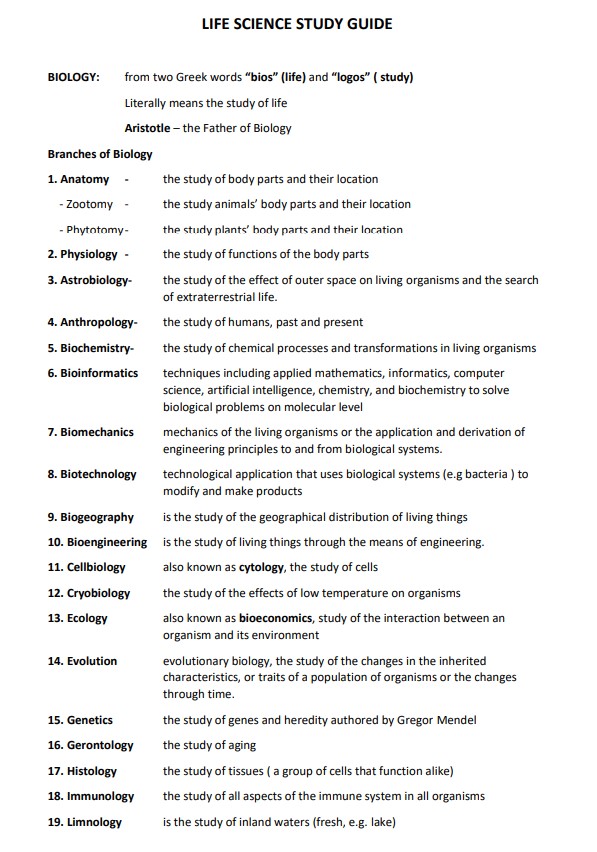Life Science Study Guide
Summary:
Biology, derived from the Greek words “bios” (life) and “logos” (study), is the study of life. Aristotle is known as the Father of Biology. Various branches of biology include Anatomy, Physiology, Astrobiology, Anthropology, Biochemistry, Biotechnology, Ecology, Genetics, and Zoology, among others.
The beginning of life has been hypothesized through concepts such as Spontaneous Generation/Abiogenesis, Francisco Redi’s experiments with meat in jars, Lazaro Spallanzani’s experiments with broth, Louis Pasteur’s Swan-necked experiment, Alexander Ivanovich Oparin’s hypothesis, and the Miller-Urey experiment.
The cellular basis of life has been studied by scientists like Robert Hooke, Anton van Leeuwenhoek, and Robert Brown, leading to the development of Cell Theory. The chemical bases of life include elements such as oxygen, carbon, hydrogen, and nitrogen. The cell is the basic unit of life and can be either prokaryotic or eukaryotic, with various cellular parts like the plasma membrane, cytoplasm, mitochondria, ribosomes, and nucleus.
Cellular transport can be either passive (diffusion, osmosis, facilitated diffusion) or active (ion pumps, cotransport, bulk transport). Photosynthesis captures light energy to produce food-energy-rich organic molecules, while cellular respiration releases energy from food in the presence of oxygen.
Excerpt:
Life Science Study Guide
BIOLOGY: from two Greek words, “bios” (life) and “logos” ( study)
– Literally means the study of life
– Aristotle – the Father of Biology
Branches of Biology
1. Anatomy – the study of body parts and their location
– Zootomy – the study of animals’ body parts and their location
– Phytotomy- the study of plants’ body parts and their location
2. Physiology – the study of functions of the body parts
3. Astrobiology- the study of the effect of outer space on living organisms and the search for extraterrestrial life.
4. Anthropology- the study of humans, past and present
5. Biochemistry- the study of chemical processes and transformations in living organisms
6. Bioinformatics techniques, including applied mathematics, informatics, computer science, artificial intelligence, chemistry, and biochemistry to solve biological problems on a molecular level
7. Biomechanics mechanics of living organisms or the application and derivation of engineering principles to and from biological systems.


Reviews